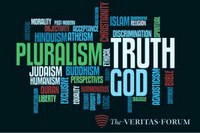Pluralism: It's All in the Context
Kevin Moss | 21:15, 18th March 2014
 Since we are approaching Easter at full speed, I was going to write a post on the resurrection of Christ, that ineradicable core of the Gospel, where the facts all coalesce to support the claim that ‘Christ is Risen’. But, actually, I’ve been asked to write a piece on pluralism instead. In my (limited) experience it’s not one of the first words which comes to mind in describing our culture, but it clearly sits there in the same conceptual silo as terms such as ‘relativism’ and ‘naturalism’.
Since we are approaching Easter at full speed, I was going to write a post on the resurrection of Christ, that ineradicable core of the Gospel, where the facts all coalesce to support the claim that ‘Christ is Risen’. But, actually, I’ve been asked to write a piece on pluralism instead. In my (limited) experience it’s not one of the first words which comes to mind in describing our culture, but it clearly sits there in the same conceptual silo as terms such as ‘relativism’ and ‘naturalism’.
So, what do we mean by it? I am going assume that (due to context) we’re not going to concern ourselves with political pluralism, a distinct branch of political philosophy – what we’re interested in, here, is religious pluralism. But even here we need to take steps to clear away the ambiguity.
At a very basic level, pluralism is the recognition that there are many forms of religious belief, which adopt quite different approaches towards the spiritual life. They all have their own little quirks and emphases – someone who shops around for the bits they like, whether or not they actually practice a religion, is a religious pluralist. But even that may not be clear enough. The term can be used to make a statement of fact: the claim that different people follow different religious systems. This is uncontroversial. Equally uncontroversial is the extension of the idea into religious freedom – that the range of religions means that people are free to practice their own choice, at least in the West, and subject to the increasingly draconian restrictions of the secularists.
But, actually, the concept of 'religious pluralism' goes way beyond these things: heavily dependent upon the philosophical underpinnings of relativism (there are no absolutes), it claims that any (or perhaps all) religions lead to God or salvation – so following any religious path enables (any) believers to reach the religious goal. In certain liberal christian (small c) cultures, the idea has been expounded vigorously and enthusiastically, if not with much deference to intellectual rigour. It is worth noting how tied to an ideological position this viewpoint is in practice.
Firstly, there are some big assumptions being made about the nature and direction of religious belief – if it is then true to say that we're all on the same path, all heading in the same direction, all with the same goal. That view depends heavily upon a minimalist view of the content of the various systems: a follower of Christ has no interest in disporting himself in a form of paradise characterised by an abundant supply of virgins, neither does he gibber with excitement at the prospect of going through a kind of spiritual blender in order to be merged into Oneness. If the beliefs, practices and goals are that fundamentally different then pluralism is indeed missing the point entirely.
But there's more. What kind of a thing is religion, that we may so easily adopt a pluralistic stance? Let's draw an analogy. Let's say that the 'religious life' is like a weekend expedition on a 'fungal foray'. We equip ourselves with wellies, baskets and venture into the woods to gather mushrooms. From a pluralistic perspective, all the fungi we come across are direct equivalents of each other. And who knows, we might get lucky: Wood Mushrooms are delicious, so are Oyster Mushrooms and a great many others. But, at some point, the laws of probability are going to trip us up: it is said that Death Caps were behind the demise of the Emperor Claudius in 54AD, and they look pretty appealing to me. And there are many others of a similar ilk ('The Sickener' says it all).
Clearly, in the world of woodland fungi, pluralism simply isn't going to work. So why do 'religious pluralists' think that their version is more 'true', or more reliable? The answer lies in their view of what religion actually is: if it's just about a set of personal convictions that actually have nothing to do with any definable reality, then of course the dogmatic content is completely valueless. One can just pick and choose to suit our own sense of taste – and that's all fine and dandy, because it’s just jargon. The instant one understands this proposition, then it becomes clear why secularists have carefully fostered this concept of religious pluralism. If all religious systems are equally valid, equally beneficial and (ultimately) equally important – then all of them may be dismissed as equally irrelevant.
Of course, playing with ideas on this level requires us to ignore the factual and historical background and content to Christianity. The Christian revelation shows us God working his purposes out through history, and ultimately leaving his mark in the demonstrably historical events of Christ's life, death and resurrection. Which, happily, brings us back to Easter.
Document Actions

